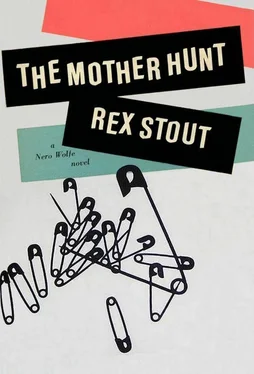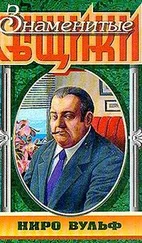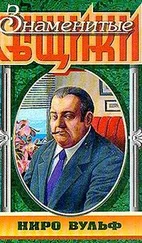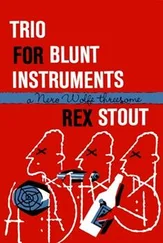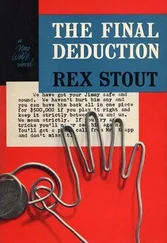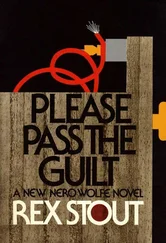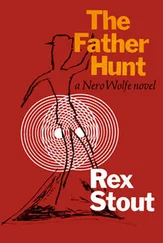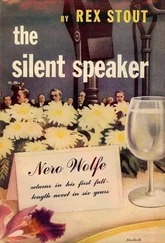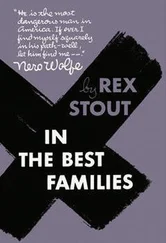No reply.
“You didn’t. You couldn’t.” Bingham returned to Wolfe, “I used another wrong word. Carol wasn’t a tramp. She certainly wasn’t a floozy. Would a floozy leave a good job for six months to have a baby?”
“But you haven’t decided to believe me.”
“Hell, I believe you. I believe you because it fits Carol exactly. King’s right, Dick was the father. And Dick was dead, so she could go ahead and have the baby. See? There wouldn’t be a man it would belong to, it would just be hers. Then after it came she realized she didn’t want it. She wouldn’t be tied to a man, but it would be just as bad to be tied to a baby, only she didn’t realize it until after it came. That’s why I believe you, it fits her to a T. One thing I don’t like, I admit it. You say someone helped her dispose of it, so she must have asked him to. Why didn’t she ask me? That hurts. I mean that, it hurts.”
He reached for the bottle with one hand and the glass with the other, poured, and took a healthy swallow. He wasn’t appreciating the cognac, he was just drinking it. “Damn it,” he said, “she should have asked me.”
“Possibly she preferred to ask a woman.”
“Not a chance. You can rule that out. Not Carol. Didn’t it have to be kept secret?”
“Yes.”
“She wouldn’t have trusted any woman to keep any secret. She wouldn’t have trusted any woman, period.”
“You’re hurt that she didn’t ask you, that she didn’t prefer you to the other available alternatives. So you must have some notion of who the other alternatives were. This question is not hypothetical; consider it established that she asked someone to help her dispose of the baby; whom did she ask, if not you?”
“I don’t know.”
“Of course you don’t. But whom might she have trusted in so delicate a matter in preference to you?”
“You know, by God, that’s a thought.” Bingham put the glass to his lips and held it there. He took a little sip. “First I would say her ex-husband. Willis Krug.”
“Mr. Krug says his only recent association with her has been on business matters. You challenge that?”
“No. I’m just answering your question. It’s a damn good question. I know how Carol felt about Krug. She liked him. She felt he could be trusted, he could be depended on. But if he says it wasn’t him it probably wasn’t. My second pick would be Julian Haft.”
Wolfe grunted. “You’re merely naming those present. You’re clowning.”
“I am not. Carol thought Haft was the tops. She thought nobody was in his class as a judge of writing, and she let him know it. He was the only man she would have dinner with and then go home and read manuscripts. That’s another reason tramp was the wrong word for her; she liked her work and was good at it. I can clown, but I’m not clowning now. But I shouldn’t have put Krug first. I overlooked Manny Upton. He should be first.”
“Her employer.”
“Well, her boss. That’s why he’s first. He let her go for six months and come back to her job. He must have known what she went for. She told her friends, including me, that she was taking a long vacation, but she must have told Manny the truth. Hell, it’s obvious. If you’re half as good as you’re supposed to be — it stares you in the face.”
“It does indeed. But it was only yesterday afternoon that she was sitting in the chair you occupy. Granting that Mr. Upton is the most likely of the alternatives, are there any others? Besides Mr. Haft and Mr. Krug?”
“No.” Bingham took a sip of brandy. “Not unless there was someone I didn’t know about, and I don’t think there was. Carol liked to tell me things. She liked the way I took things.”
“I believe I asked you if you killed her.”
“And I said certainly. I meant certainly I didn’t. You haven’t asked me where I spent last night and how and when I learned of her death. I spent the night at home in bed, alone, and I was at the studio before nine o’clock, at work. I’m getting up a pilot for a big fall show and I’m a month late. Someone at the studio heard it on the radio and told me. And there had been a picture of her in the batch you sent me Tuesday. I broke away as soon as I could and came to ask you about the picture. I knew damn well you must know something.”
“So you recognized the picture.”
“Of course I did. The reason I didn’t say so, and I didn’t put her on my list, was the same as King’s, only he says his was subconscious and mine wasn’t. You had told us you were looking for someone who had sent anonymous letters to Lucy Valdon. Carol Mardus couldn’t possibly have sent anonymous letters to anybody. I didn’t need my subconscious to tell me that.”
“You were intimate with her, Mr. Bingham?”
“Balls. No, we were never on speaking terms. We used smoke signals.” He looked at his watch. “I’ve got to get back to the studio.”
“We should finish soon.” Wolfe reached for his glass, emptied it, and put it down. “Mr. Haft. You are now conspicuous, on Mr. Bingham’s roster of alternatives. I invite comment.”
Haft was slumped in his chair with his spindly legs stuck out straight. Some men look all right slumping, but he wasn’t built for it. He had finished his scotch and soda and put the glass on Wolfe’s desk.
“I suppose I should feel flattered,” he said. His thin tenor was quite a contrast to Bingham’s full baritone. He turned his head to Bingham. “I appreciate it, Leo, your thought that Carol considered me worthy of her confidence on so delicate a matter. Even though you put me last, with Manny Upton first.” He switched to Wolfe. “Since Bingham has accurately indicated the nature of my relations with Miss Mardus there seems to be nothing for me to say, except to answer for myself regarding the list and the picture. But on that too I have been anticipated. I can only parrot the others. Miss Mardus could not be guilty of sending anonymous letters. I believe that— No, you asked them about last night. Customarily I spend weekends at my home in Westport, but one of my most important authors, at least important to me, arrives this afternoon from England, and I’m taking him to dinner and the theater this evening. I slept in my suite at Churchill Towers, and I was there when Bingham phoned. I didn’t know about Miss Mardus until he told me.” He pulled his feet back. “Have you any questions?”
Wolfe was frowning at him. “What is the name of the important author?”
“Luke Cheatham.”
“He wrote No Moon Tonight”
“Yes.”
“You publish him?”
“Yes.”
“Please give him my regards.”
“With pleasure. Certainly.”
Wolfe looked at the clock. Twelve minutes to four. Plenty of time for a little speech. He surveyed them. “Gentlemen,” he said, “we may not have mutual trust, but we have a mutual interest. Your professed reason for omitting the name of Carol Mardus from your lists and declining to identify her picture may or may not satisfy me, but it certainly wouldn’t satisfy the police. They would suspect that for one of you it was false, and none of you can prove it genuine. So you don’t want them to know what has been said here, or even that you have been here, and neither do I. That’s our mutual interest. As for the outcome, we’ll see. The man who killed Ellen Tenzer and Carol Mardus will inevitably be brought to account. For the reasons I gave you, I wish to be the instrument of his doom. With luck I will be.”
He rose. “In any case, I am obliged to you on behalf of my client.” He headed for the hall, five minutes ahead of schedule. Leo Bingham looked at the brandy bottle, then at his watch, sprang to his feet, and went. I followed. In the hall Wolfe was entering the elevator. Bingham beat me to the front door, and I held it open because the other two were coming. They nodded as they passed by, and I stood on the sill and watched them down the stoop before I returned to the office.
Читать дальше
